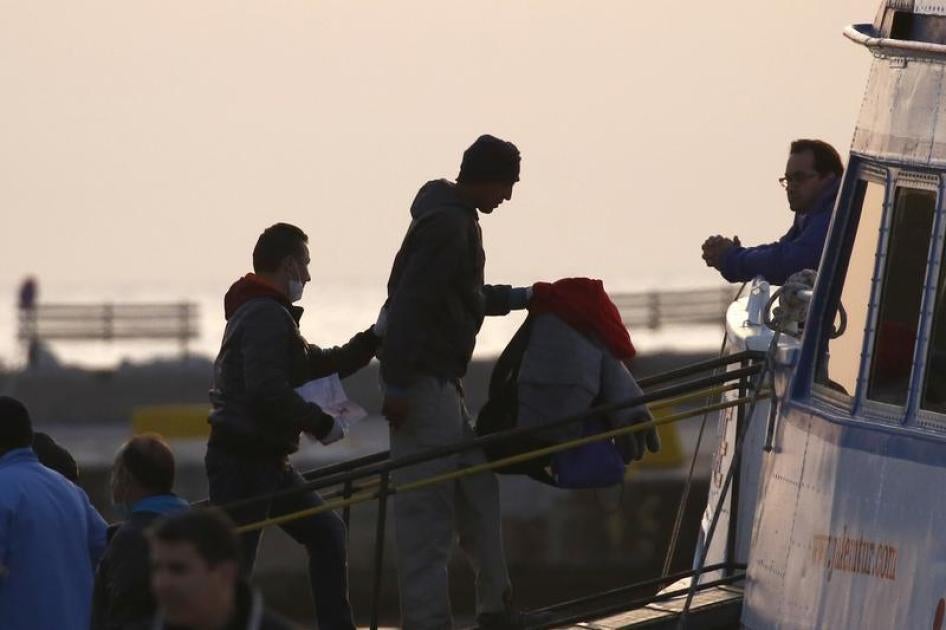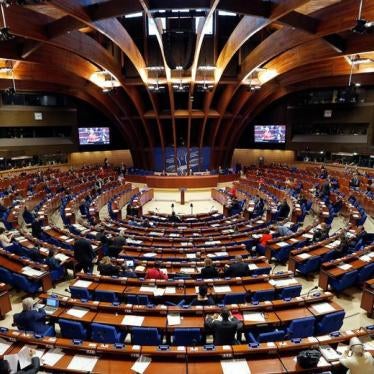(Athens) – The September 22, 2017 decision by Greece’s highest administrative court that two Syrian asylum seekers can be deported to Turkey because it deems Turkey a safe third country for them puts people at risk.
“Greece’s Council of State has failed to protect the rights of asylum seekers,” said Eva Cossé, Greece researcher at Human Rights Watch. “Despite the fact that Turkey does not provide non-Europeans fleeing persecution full rights as refugees, and despite the obstacles Syrians and other asylum seekers in Turkey face in getting education and other basic services, the court has given a green light to returning the two Syrian men there without first hearing their refugee claims.”
The Council of State grand chamber heard an appeal by the two men, ages 22 and 29, of decisions by lower administrative tribunals that they could be returned to Turkey to have their refugee claims heard there because it can be considered a safe third country for the men. Other lower tribunals are likely to abide by the ruling, paving the way for the return of other Syrian asylum seekers from the Greek islands to Turkey.
The case was heard in the context of a March 2016 agreement between the European Union and Turkey that aims to return most asylum seekers from the Greek islands to Turkey without first hearing their refugee claims. The agreement is based on the flawed assumption that Turkey is a safe third country for asylum seekers. Under the deal, Turkey receives billions of euros in aid, visa liberalization for Turkish citizens, and revived negotiations for Turkish accession to the EU.
No asylum seeker has yet been forcibly returned to Turkey under the terms of the EU-Turkey deal without the merits of their refugee claim first being considered. But more than 1,200 people were removed to Turkey after their claims were rejected on the merits or because they did not file an asylum claim or agreed to return voluntarily. Tens of thousands of people have been confined in deplorable and volatile conditions on Greek islands, prevented from traveling to the Greek mainland since the deal went into effect.
EU asylum law allows EU governments to return asylum seekers to a “safe third country” without hearing their refugee claims only if the country respects the principle of nonrefoulement – that is, not removing or returning people to countries where they face the risk of torture and cruel, inhuman, or degrading treatment or threats to their life and liberty; and if the asylum seeker may apply for asylum there and enjoy all the protections afforded by the 1951 Refugee Convention if recognized as a refugee.
Turkey maintains a geographical limitation to its accession to the Refugee Convention that excludes non-Europeans from refugee status.
Syrian refugees living under temporary protection in Turkey officially have access to free health care and education for their children. But many of the over 2 million Syrian refugees who live outside the refugee camps in Turkey struggle to get housing, and large numbers live in abject poverty. More than 300,000 Syrian children are out of school, according to the latest available data, because they are working to provide for their families; they cannot afford transportation or school supplies; or other reasons such as bullying in some schools. Non-Syrian asylum seekers in Turkey including Afghans and Iraqis are ineligible for temporary protection or basic state services.
“By the EU’s own standards, Turkey cannot be considered ‘a safe third country’ for Syrians or others seeking refuge,” Cossé said. “It’s deeply disappointing that the Greek courts have embraced the flawed logic of the EU-Turkey deal.”
|
News Release
Greece: Highest Court Fails Asylum Seekers
OKs Deporting 2 Syrian Men to Turkey Without Hearing Refugee Claims
Your tax deductible gift can help stop human rights violations and save lives around the world.
Region / Country
Most Viewed
-
November 25, 2019
A Dirty Investment

-
April 27, 2021
A Threshold Crossed

-
May 12, 2025
The Gig Trap

-
January 23, 2018
Hidden Chains

-
September 30, 2024
“They Destroyed What Was Inside Us”





